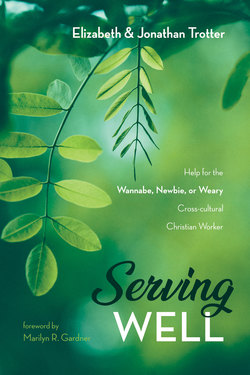Читать книгу Serving Well - Jonathan Trotter - Страница 12
На сайте Литреса книга снята с продажи.
One Question You Should Get Used to Asking
Оглавлениеby Jonathan
It’s a simple question, carrying with it the power to clarify purpose and extend longevity. It’s a question that buttresses against the nasty cousins of burnout and bitterness. It’s a question we need to ask more often.
It’s simply this: “What is it that I really need?”
We’ve got to start asking our cross-culturally working selves, “In an ideal world, what is it that I really need to make it? To thrive? To be okay? To survive where God’s called me? What is it that I really need?” Before you crucify me for turning the gospel inside out and hamstringing it with a message about me and my needs, hear me out.
I’m not at all advocating a life without obedient sacrifice; I am expressly advocating a life of eyes-open sacrifice. You might not get what you need. In fact, I’m pretty sure you won’t. There are a lot of things you need that a life of cross-cultural service just won’t be able to provide. I’m talking about the full spectrum here, from a Starbucks latte all the way to the absence of gunfire. And that’s where this gets real.
When you realize that some legitimate needs won’t get met, when you realize that safety and functioning utilities and access to public libraries and date night just aren’t as much a thing where you live, you can do two things. You can seek to mitigate, or you can choose to sacrifice. In reality, I actually recommend both.
1. Mitigate it: Consider whether there are any creative workarounds that might meet the need, in whole or in part.
2. Sacrifice it: Obediently, with a full heart and open eyes, sacrifice the thing as a holy act of worship.
The Importance of Knowing Your Sacrifice
It can appear holy to deny that there even is a sacrifice. Rachel Pieh Jones wrote of this4 when she responded to some missionary heroes who claimed they never made a sacrifice. She writes: “While I understand the sentiment and the faith-filled valor behind it, I respectfully disagree.”
So do I.
Denial and acceptance appear to be identical twins—that is, they look pretty similar—but they’re not at all the same. In fact, denial and acceptance have extremely different personalities and life goals.
Denial claims to honor God by minimizing the sacrifice; acceptance actually honors God by embracing the sacrifice and still considering him to be worth it. Denial shrinks the story, collapsing grief and trauma and fear and loss into a singularity; acceptance explodes the story, showcasing the magnificent power of God through the grief and trauma and fear and loss.
Acceptance leads to deep emotional health, grace, contentment, processed grief, and a willingness to see the long view, both forward and backward. Denial leads to, well, nothing. Denial is a full stop, halting maturation and ongoing discipleship. Acceptance is a grand “to be continued,” allowing for what was, while simultaneously looking forward to what will be.
What Is it that I Really Need?
Before deciding whether to mitigate or sacrifice, we must seek to know our sacrifice. How do we do that? Ask the question, “What is it that I really need?” Many of us never do this. We have a strong aversion to saying “I need,” which is ironic because the Jesus we serve often responded really well to folks who led with their needs.
Our needs must be named, if only to be offered up willingly. Abraham’s boy who carried wood and fire had a name. Paul sought to mitigate his thorn, and then ended up gloriously sacrificing his need to have it extracted. Jesus saw and comprehended skull-hill, attempted to mitigate it, and then climbed it.
Sometimes the cup doesn’t pass.
Mitigate and Sacrifice
To mitigate is to make something less severe, less painful, less onerous. So, can I please encourage you? If there’s something severe, painful, and onerous about life and ministry abroad, and if that hard thing can be lessened, for goodness sake, lessen it.
But if it cannot be lessened (and this will often be the case), then it must be sacrificed with your eyes and hearts open. At those times, we must remember, over and over and over again, why we’re here. And when a sacrifice is required, we rest in God’s ultimate goodness. We obediently make the sacrifice, casting ourselves on the grace and mercy of our King.
~~~~~~~~~~
We believe that there are indeed sacrifices to be made.
We believe that those sacrifices do in fact cost something.
AND
We believe that eternity will bear witness:
The cost was not too high,
The cross remains enough,
The Christ, once seen face to face, will make it all imminently worth it,
Forever.
4. Jones, “Why I Will Not Say,” line 4.
